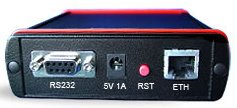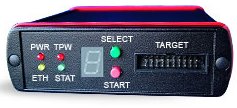JTAG emulator adds NAND flash programming
Aug 30, 2006 — by LinuxDevices Staff — from the LinuxDevices Archive — 15 views Ronetix has upgraded the firmware inside its JTAG-interfaced emulator and flash programmer. The new firmware allows the PEEDI JTAG tool to be used for direct programming of NAND flash connected to ARM7, ARM9, and XScale processors, enabling “easy” use of NAND as a system boot device, according to the company.
Ronetix has upgraded the firmware inside its JTAG-interfaced emulator and flash programmer. The new firmware allows the PEEDI JTAG tool to be used for direct programming of NAND flash connected to ARM7, ARM9, and XScale processors, enabling “easy” use of NAND as a system boot device, according to the company.


The PEEDI now supports 8- and 16-bit NAND chips, with up to 8Gbit (1GB) capacity. Additionally, it provides bad block management, which handles the bad blocks during programming and enables PEEDI to forcibly mark blocks as bad or healthy, the company says. In standalone mode, the device can now program more that 800 flash chips, as well as AT91SAM7, LPC2000, MAC7100, STR7, TMS470, and Atmel DataFlash families, according to the company.
PEEDI is said to provide a “very high real download speed” of up to 1 megabyte per second. The device offers native GNU gdb support and allows Linux application debugging, in general, and Linux kernel debugging when an MMU is available, the company says.
Key features and specs of the PEEDI JTAG programmer, as listed by the company, include:
- Multicore support — up to 4 cores
- Built-in support for gdb (remote target via Ethernet).
- Very high real download speed, up to 1MBytes/sec
- 5KHz to 33MHz JTAG clock using 3.5m standard cable.
- Target Voltage 1.2V to 5V.
- Built-in telnet command line interface.
- Built-in very fast Flash programmer that supports over 800 Flash devices.
- Can be used as a standalone Flash Programmer, up to 15 images stored on MMC/SD card controlled by front panel interface.
- Small robust aluminum case; size approx. 4.5 x 4.1 x 1.3 inches (115 x 105 x 34mm)
- DCC over TCP support
The new firmware appears to be shipping immediately. The company did not disclose current pricing, but the device was priced at around 1,500 Euros last summer.
This article was originally published on LinuxDevices.com and has been donated to the open source community by QuinStreet Inc. Please visit LinuxToday.com for up-to-date news and articles about Linux and open source.